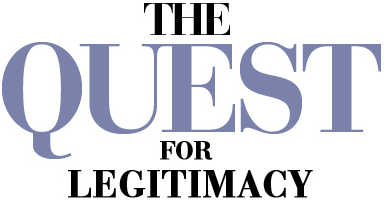Ever ponder what it’s like to live in the shadow of greatness? Envision a realm in which every success, no matter how remarkable, is judged against the achievements of prior generations. This world isn’t just hypothetical—it’s real for many children born into prominent families.
The towering figures of success—parents or grandparents—cast long shadows from which it can feel impossible to escape. In this landscape, each step you take echoes with their achievements and expectations. But within these shadows lies an exciting journey: The Quest for Legitimacy.
This journey is all about finding yourself and blazing your own trail amidst family traditions. You’re steering through intricate dynamics while developing your individual identity outside the family limelight—it’s an exciting, yet tough ride! As we explore this intriguing landscape together, you’ll pick up tactics to handle relationships within successful families and realize how crucial dependable mentors are in directing personal growth.
Understanding the Challenges of Growing Up in Prominent Families
The struggle to establish a personal identity while growing up in a prominent family is often overshadowed by enormous expectations. The pressure can be daunting, as every step you take seems to be overshadowed by past successes.
The Shadows Cast by Successful Family Members
A common phenomenon for children from successful families is feeling dwarfed by their ancestors’ achievements. This perception influences their self-worth and ambition, leading them to question whether they can ever match up, or if they are destined to remain just footnotes in the family’s illustrious history.
On the flip side, some individuals leverage this unique position into motivation rather than seeing it as an insurmountable hurdle. They harness familial success stories as fuel for setting even loftier goals for themselves.
The Land of Giants: Defining Personal Accomplishments
In environments where outstanding achievement is par for the course, defining what constitutes personal success becomes tricky territory. Every accomplishment may seem insignificant when measured against a backdrop adorned with laurels that bear witness to generational brilliance.
Research shows, however, that acknowledging your own accomplishments – no matter how small they may seem relative to others’ feats – boosts mental health and resilience.
This might not get rid of shadows entirely but would help bring more light onto oneself amidst giants.
Navigating the labyrinth of identity and expectations in elite families isn’t a cakewalk. Yet, acknowledging personal wins, no matter how small against ancestral triumphs, can light your path to resilience. #FamilyLegacy #SelfWorthClick to Tweet
The Quest for Self-Determination in Prominent Families
Every expedition commences with a solitary stride, and the way to self-governance is no different. For children of prominent families, this quest begins with awareness.
Awareness Phase
During the awareness phase, kids start understanding their unique standing within their family and society at large. They recognize that they’re not just ‘kids,’ but members of influential families, carrying weighty expectations.
This recognition can be overwhelming, leading them to question who they are beyond their familial roles. But remember: questioning isn’t a crisis; it’s an opportunity for growth.
Tug-of-War Phase
Welcome to the tug-of-war phase. This stage sees young individuals juggling personal aspirations against established family norms—a classic case of “Me vs. Us.” Balancing individuality with tradition can feel like walking on a tightrope while juggling flaming torches.
The struggle may seem unending, but fret not—it’s part of growing up in accomplished households where legacies loom large overhead. The good news? This tussle often leads to profound self-discovery—kindling the resilience needed for future challenges.
Exploration Phase
Within the realm of prominent families, one’s journey is often a complex dance between independence and familial obligations. This intricate navigation involves managing expectations, resolving conflicts, and bridging communication gaps.
The act of leaving home can be seen as an initiation rite into adulthood for many young individuals from wealthy families. It serves as their first taste of self-reliance outside the cocoon of privilege.
However, returning home after experiencing life independently might bring about its own set of challenges. The family they return to may seem different—unfamiliar even—as perspectives change with exposure to new environments or experiences.
This friction often stems from discrepancies between evolved individual identities and static family dynamics. A sense of alienation could arise if these changes are not acknowledged or accommodated within the family structure.
Ownership Phase
Assuming responsibility for one’s life involves cultivating a profound sense of self-esteem, direction, and authenticity. It isn’t primarily about the eventual destination one reaches, but rather about seizing command of one’s existence and making a distinctive contribution to the world aligned with the vision and principles nurtured over time.
Navigating family dynamics can feel like a complex dance, especially for the elite. Stepping out and returning with new perspectives often shakes things up. #FamilyDynamicsClick to Tweet
The Role of Trustworthy Mentors
Picture yourself on the brink of a precipice, gazing out at an expanse of potential and options. This is what growing up in a prominent family feels like. The expectations are high, the stakes even higher. But there’s help – trustworthy mentors.
Mentors act as guiding stars, illuminating paths otherwise hidden by shadows cast by towering familial achievements. Studies have shown that mentorship significantly contributes to personal and professional development.

Mentorship Outside Family Circles
In this journey for legitimacy, seeking mentorship outside family circles can be crucial. They provide fresh perspectives and unbiased advice without any preconceived notions or inherent biases that might come from within the family structure.
A research study revealed a significant increase in resilience among young adults who had mentors outside their families compared to those who did not (Key Stat 1). Another compelling statistic shows that mentees are more likely to pursue unconventional career paths instead of sticking with ‘family business,’ allowing them space for self-expression.
Sometimes it takes someone from beyond our immediate world to let us see ourselves more clearly—to recognize strengths we may overlook and offer insights into areas where we could improve—providing another stepping stone towards establishing one’s identity distinct from their illustrious lineage.
Ever feel like you’re on a cliff’s edge, gazing at an ocean of potential? That’s growing up in an elite family. It’s tough, but mentors are the guiding stars. Studies show they boost personal growth & resilience – especially those outside your family circle.Click to Tweet
Rites of Passage in Wealthy Families
The world of prominent families often revolves around a unique set of traditions and rites that can significantly shape the upbringing of children. These rituals, or “rites of passage,” serve as benchmarks for personal development, reinforcing familial values while marking progress toward adulthood.
The Impact of Rites of Passage on Identity Formation
In any family setting, rites are essential elements that help forge individual identity. However, within wealthy families, these events take on even more significance due to the high societal stakes involved. It’s not just about maturing; it’s about preparing oneself for leadership roles and preserving the legacy left by previous generations.
Each rite presents an opportunity for young individuals to reflect upon their place within their family structure. They offer valuable lessons in responsibility, commitment, and respect – all critical attributes needed when navigating life in influential circles.
A good example is a ‘coming-of-age’ ceremony common among affluent families: The debutante ball (‘Debuts’ and how they evolved). This social event doesn’t merely celebrate a girl’s transition into womanhood but also introduces her officially into society – demonstrating both personal growth and acknowledgment from peers.
Another noteworthy rite is managing one’s first investment portfolio (Understanding Investment Portfolios). Not only does this represent fiscal maturity but also symbolizes trust placed by elders on younger members to sustain wealth across generations – thus emphasizing their crucial role within the family unit.
Surely there may be variations based on cultural nuances or specific traditions each prominent family holds dear. Yet fundamentally these milestones act as pillars supporting a child’s quest towards legitimacy, providing structure in an otherwise overwhelming world of affluence and expectation.
Discover how rites of passage shape the rich tapestry of elite families. It’s not just growing up, it’s about embracing legacy, leadership roles and high-stakes societal expectations. #FamilyTraditions #WealthyLifeClick to Tweet
The Book as a Guide for Children, Parents, and Mentors

“The Quest for Legitimacy” is an indispensable resource to assist children of esteemed families in discovering their individual paths while respecting the accomplishments of their lineage. It’s an essential tool that offers help to children from prominent families grappling with their identity amidst the towering achievements of their kin.
For these young individuals, this insightful guide illuminates the path toward forging their own destiny while respecting family traditions. The text delves deep into common struggles faced by such kids like reconciling personal aspirations with familial expectations or seeking approval in highly competitive environments.
Guide for Children: Navigating Through Family Shadows
A key aspect where “The Quest for Legitimacy” shines is its guidance specifically designed to let the newest generation navigate through what can sometimes feel like an overshadowing family legacy. This isn’t about teaching them how to surpass these standards but rather encouraging them to understand that they have unique abilities worth celebrating too.
In essence, it empowers children by validating their feelings and fostering resilience in challenging circumstances.
Mentorship Outside Family Circles
Beyond helping children find their voice within powerful dynasties, the book also emphasizes the role mentors outside family circles play in providing unbiased advice and perspectives. By connecting with trusted figures beyond immediate relations, one gets new viewpoints free from inherent biases associated with close ties.
Looking for a compass in the maze of elite family dynamics? “The Quest for Legitimacy” shines a light on youngsters’ unique journeys, fostering resilience and celebrating individual abilities. Discover more. #SelfHelp #IdentityClick to Tweet
Conclusion
Undertaking the mission for approval is no simple accomplishment. It’s a journey through shadows, battles of personal desires versus familial expectations, and delicate navigation of intricate dynamics.
Remember this: You’re not alone in your quest. Awareness will dawn on you about your unique position within the family. Expect a tug-of-war phase as you balance between individuality and legacy.
A trustworthy mentor can guide you to make sense of it all, offering unbiased advice from outside the family circle. Your rites of passage? They shape your identity formation in profound ways.
The road may be winding but remember – it leads to self-discovery and growth beyond those long-cast shadows!
Do you feel called to explore greater purpose, identity, and personal contribution as a member of a storied family? The Quest for Legitimacy is for you. Order your copy here and start the quest.

